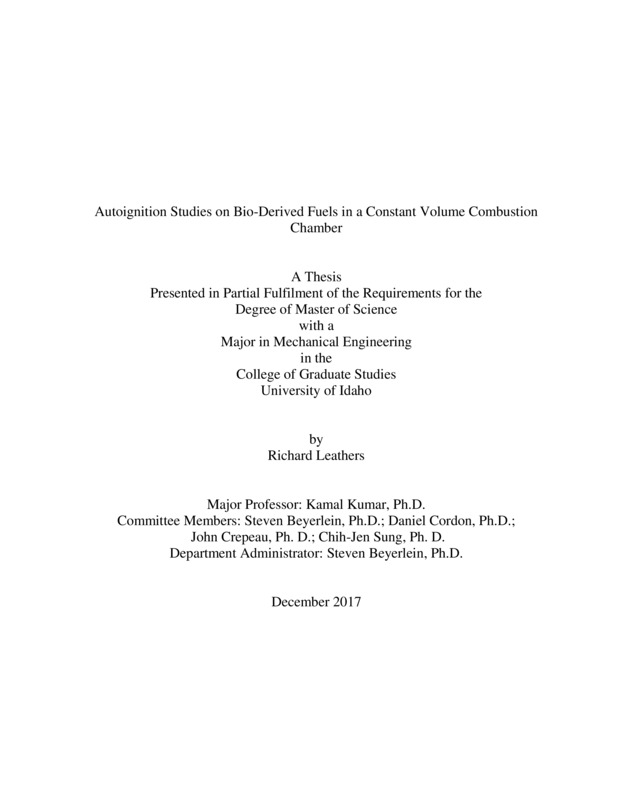Autoignition Studies on Bio-Derived Fuels in a Constant Volume Combustion Chamber
Leathers, Richard Lee. (2017-12). Autoignition Studies on Bio-Derived Fuels in a Constant Volume Combustion Chamber. Theses and Dissertations Collection, University of Idaho Library Digital Collections. https://www.lib.uidaho.edu/digital/etd/items/leathers_idaho_0089n_11250.html
- Title:
- Autoignition Studies on Bio-Derived Fuels in a Constant Volume Combustion Chamber
- Author:
- Leathers, Richard Lee
- ORCID:
- 0000-0002-2771-5319
- Date:
- 2017-12
- Keywords:
- Autoignition Constant Volume Combustion Chamber Methyl Decanoate n-Butanol
- Program:
- Mechanical Engineering
- Subject Category:
- Mechanical engineering
- Abstract:
-
This thesis reports three works on experimental investigation into the autoignition behavior of bio-derived fuels. Understanding the autoignition behavior of current and future fuels is essential for their clean and efficient use in future energy system. Fuel sprays were injected into a quiescent, pressurized, and preheated air in a constant volume combustion chamber using the Waukesha Fuel Ignition Tester. Autoignition times were determined using the absolute pressure rise and rate of pressure rise within the combustion chamber. Data for potential biofuels has been obtained in the different temperature range of 680 K to 820K and at a pressure of 24 bar. The experimental results provided the Derived Cetane Number (DCN) of the fuel or blend. The DCN is a valuable metric in classifying the about ignition propensity of a fuel. A representative correlation for the DCN as a function of a fuel volumetric blending ratio has been provided where appropriate.
Additionally, the exhaust emissions of the different biofuels have also been studied using non-dispersive infrared analyzers for species like CO, CO2, O2, & HC. A chemiluminescence detector was used to measure NOx emissions. A global equivalence ratio of the fuel or blend was derived from the exhaust gas analysis. Using the global equivalence ratio, the experiments were simulated using a zero-dimensional, constant volume, homogenous reactor model with detailed reaction mechanisms.
The work focused on biofuels such as n-butanol, methyl decanoate, and biodiesel made at the University of Idaho’s biological engineering facility. n-Butanol was chosen for study because it is a potential second-generation biofuel that has certain benefits over ethanol. Methyl decanoate is a fatty acid methyl ester commonly used as a biodiesel surrogate. Biodiesel produced from corn, canola, and soy feedstocks were studied. The fatty acid profiles of the aforementioned biodiesel fuels were known. This rendered an investigation into the influence of the degree of saturation on the autoignition results.
This work has a significance to both the lab and field. Results like the DCN representative correlation will be useful in determining what mixture of bio-fuel one can use in a certain system. Moreover, the FIT data can be used as a tool to support the validation of chemical mechanisms. Accurate chemical mechanisms are essential for allowing predictive capability in computational models. A first step towards investigating under what conditions the FIT can support the validation of chemical mechanisms has been done via a rudimentary 0-D , constant volume, reactor model that does not consider any physical effects. In general, the agreement between the experimental results and the simulated are results is fair, but could be improved upon. It has been concluded that the homogenous reactor assumption is not entirely accurate for experiments were the ignition delay is short; this is suspected to be because the physical effects of the fuel spray dominate the autoignition behavior. Comparisons between the experimental results and the 0-D computational model may be valid for results with long ignition delay times. Future work is needed in determining the spray parameters in the FIT and developing a full computational model of the reactor that includes all the effects.
- Description:
- masters, M.Engr., Mechanical Engineering -- University of Idaho - College of Graduate Studies, 2017-12
- Major Professor:
- Kumar, Kamal
- Committee:
- Beyerlein, Steven; Cordon, Daniel; Crepeau, John; Sung, Chih-Jen
- Defense Date:
- 2017-12
- Identifier:
- Leathers_idaho_0089N_11250
- Type:
- Text
- Format Original:
- Format:
- application/pdf
- Rights:
- In Copyright - Educational Use Permitted. For more information, please contact University of Idaho Library Special Collections and Archives Department at libspec@uidaho.edu.
- Standardized Rights:
- http://rightsstatements.org/vocab/InC-EDU/1.0/

